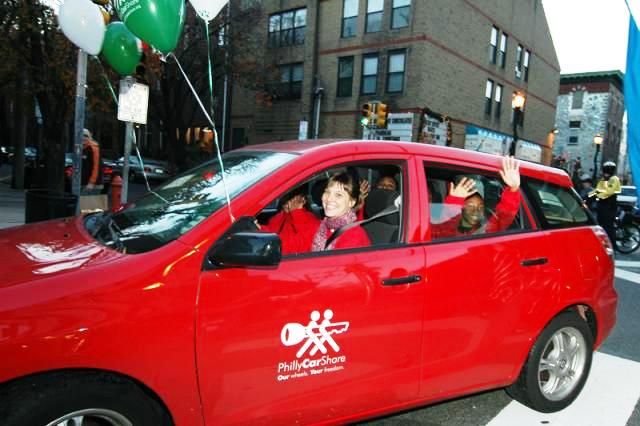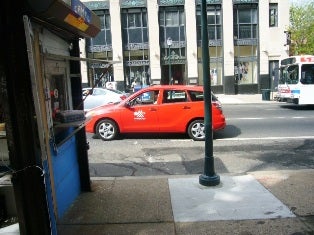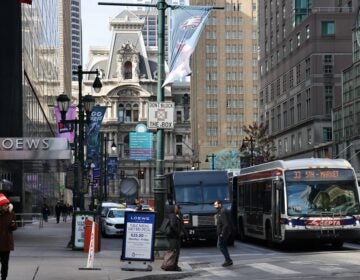Calling on all to “Walk … Ride … Share”

April 21
Previous coverage: How cars and people can co-exist
Car sharing video
By Steven B. Ujifusa
For PlanPhilly
When PhillyCarShare started in 2002, its first users were mostly a dedicated and highly-educated group of environmentalists. Its first pod was at the Whole Foods at 9th and South, a fittingly bohemian intersection. The nonprofit grew cautiously at first, confining its new pods to Center City. But when PhillyCarShare decided to remove its membership fee, it embraced a much larger swath of the city’s population.

Today, PhillyCarShare is a city-wide institution. Its 35,000 members come from all walks of life, although middle-income workers and students are heavily represented groups. Last year alone, membership grew by 6,000. Pods are now scattered throughout all parts of the city and its suburbs. In addition to its individual users, PhillyCarShare boasts many prominent corporate and educational clients. These include law firms such as Drinker Biddle and Blank Rome, as well as the University of Pennsylvania. Students at Swarthmore, Villanova, and Ursinus can reserve cars parked right on campus. Numerous Philadelphia-based architecture firms use PhillyCarShare’s vehicles to make site visits throughout the Delaware Valley. Perhaps the most high-profile client of all is the City of Philadelphia. Over the past six years, the nonprofit company has garnered a highly prized asset: hometown brand loyalty. For many young urbanites, the red Toyota Prius with the PCS badge is as much a part of the Philadelphia landscape as the trinity row house, the Art Museum steps, and the BYOB.
One would think that in a city famed for its conservative and insular nature, a progressive trend such as car sharing would have an uphill battle. But over the last few years, the city has become a national leader in the movement. Some reasons are purely economic. City residents pay extremely high insurance rates, which push the cost of owning a car well beyond the reach of many. Finding parking downtown, especially in the historic residential districts, can be a nightmare. And of course, gas has risen to over $3 a gallon. PhillyCarShare hourly fees include gas and insurance, and a parking spot awaits the driver when he or she returns the car.
But the city’s original layout and infrastructure help make it possible for many people to live a full life without a personal vehicle. “It’s a very urban city, and it’s very easy to get to places by walking,” says Clayton Lane, PhillyCarShare’s deputy executive director. “And the blocks have lots of mixed uses. In my opinion, it is the most pedestrian-friendly city in the United States. It has a very good transit system, even though Philadelphians might always complain about it.
“Despite a high level of driver intimidation, traffic is slow, making it relatively easy to bike around town. The terrain is flat, making it easy to handle for walkers and bikers alike compared to, say, San Francisco.”
Although now popular among all socioeconomic groups, PhillyCarShare still knows its strongest market. In recent years, Philadelphia has attracted a growing number of people in their twenties and thirties who want an urban lifestyle without the astronomical living and real estate costs of New York, Boston, or Washington, D.C. Members of this group appreciate progressive amenities that save them money and help improve the urban environment.
One such PhillyCarShare devotee is Rohit Chopra, an MBA student at Wharton focusing in public policy. The Voorhees, New Jersey-native and current Rittenhouse Square resident has never owned a car in his life. When he crosses the Schuylkill to attend his classes at Penn, he either walks or bikes. But when Chopra wants to have a night out in Manayunk, shop at the King of Prussia mall, or pick up a friend at the airport, he uses PhillyCarShare.
In addition to its environmental benefits and economic advantages, Chopra feels that PhillyCarShare can help transform the very fabric of the city for the better. He hates the sight of surface parking lots in Center City. “One of Center City’s biggest problems from an urban planning standpoint,” Chopra continues, “is its totally awful parking strategy. There are so many of these surface parking lots, and all cater to monthly parkers who don’t use their cars that much. These parking lots take up land that could be better used for residential or commercial purposes.” Pointing out the parking lot at the prime intersection of 20th and Walnut, Chopra says, “It’s a shame when developers feel that the great way to make money in Philadelphia is to simply own a surface parking lot. PhillyCarShare can change that outlook by encouraging better planning policy.”
Many developers are addressing the concerns of potential tenants who share Chopra’s outlook. “Developers are now interested in having pods in their buildings,” says PhillyCarShare’s Clayton Lane. “They are now seeing it as an amenity for the building, much like a swimming pool or a fitness center. On-site pods help them reduce the number of parking spots in their building. They also improve quality of life for the residents, and reduce parking and traffic impacts on the neighborhood.”
Blake Jennelle, a 26-year-old entrepreneur and 2004 Harvard graduate, is another representative of PhillyCarShare’s young user base. The CEO of Anthillz LLC and founder of the entrepreneurial group Philly Startup Leaders, Jennelle lives in Center City but has to frequently trek out to the suburbs for business. Unlike Chopra, the Doylestown-native’s reasons for using PhillyCarShare are purely practical. It was affordable, freed him from parking hassles, and allowed him to expand his network outside of the city limits. “A lot of the times I have either one-on-one meetings or networking events in greater Philadelphia, Conshohocken, King of Prussia, or on the Main Line,” says Jennelle, who uses PhillyCarShare once or twice a week. “I’ll go for maybe a four-to-five hour block because it takes about fifteen minutes to get to the car, then about 30-45 minutes driving each way, and then three hours for the meeting. I also use it to visit family in Fort Washington and Delaware for the day, as well as to go to New Jersey for grocery shopping.”
Regarding the environmental impact of PhillyCarShare, Jennelle feels that it is a nice bonus. “It’s a really easy way to go green,” he said. “Part of the brilliance of PhillyCarShare is that it provides an easy way for people who don’t think much about the environment to be eco-friendly.”
Despite the burgeoning popularity of car sharing, most PhillyCarShare users still have automobiles of their own, which they use only sporadically. Some use PhillyCarShare to avoid wear-and-tear on their personal vehicles. They also might use one of the pick-up trucks or vans in the fleet for moving or an afternoon outing at IKEA or Costco. But completely giving up their cars would simply be too drastic a step.
Clayton Lane acknowledges this problem, as for many people “it would engender a big shift in habit and lifestyle.” Heather Kemp, director of marketing at PhillyCarShare, adds that according to a Philadelphia Parking Authority study, most cars in Philadelphia are parked for at least three days at a time on city streets. “People are paying all the fees for only occasional usage,” she said.
PhillyCarShare hopes that it can help reverse this trend with the “Walk Ride Share” event. During the month of May, PhillyCarShare is challenging Philadelphians to give up their personal vehicles. The company hopes that “Walk Ride Share” will be a catalyst that will give Philadelphians the confidence that they can live a more car-free existence.
According to Kemp, the promoters of “Walk Ride Share” are targeting a combination of residential and business participants, and thus far, the response has been “overwhelming.” Each “Walk Ride Share” participant must take a vow: to put away their personal car keys for the entire month of May. After that, each individual participant receives a so-called “Mobility Package.” This includes a SEPTA transit pass and free PhillyCarShare driving credits. Philadelphia Runner is also donating a new pair of Puma running shoes to each participant, and Trophy Bicycle is throwing in free bicycle safety checks and tune-ups. In addition, the participant gets a chance to win a new Fuji bike. The mobility package for corporate users includes free Philadelphia Parking Authority passes, as well as the free bike checks and tune ups. Participants will also be encouraged to blog about their less-car-dependent lives on the PhillyCarShare website.
“Mayor Nutter has been onboard from the very beginning,” says Kemp. “He’s been making appearances at our events, although it is not confirmed if he will show up at the ‘Walk Ride Share’ kick-off.”
At the end of the month, PhillyCarShare hopes that most of the “Walk Ride Share” participants realize that they actually can live a full life without owning a car. Central City Toyota, one of the promotion’s corporate partners, will donate $500 of PhillyCarShare credits to each participant who sells them their used car. Even for those who do not participate, Kemp and Lane hope that the event raises awareness about their personal driving habits.
Although events such as “Walk Ride Share” herald the importance of car sharing in mainstream Philadelphia life, there are, of course, practical limits to PhillyCarShare’s efforts. Suburbanization has been a part of Philadelphia history since the 1880s, when the Pennsylvania Railroad built its famous Main Line and developed exclusive communities along its length. Comparable development for upper middle class Philadelphians sprouted along trolley and rail routes in West Philadelphia, Germantown, and Elkins Park at around the same time. But these early suburban communities still depended on mass transit. The big exodus of money and commerce started after World War II, when the automobile and cheaper housing made it possible for average-income families to buy a piece of the suburban dream. Many of these middle-income developments were built in towns far from the city limits. At the same time, punitive city tax policies pushed many firms out of Philadelphia’s skyscrapers and into suburban office parks in King of Prussia, and Plymouth Meeting. By and large, the commuter rail system did not expand to connect suburban communities together. As a result, inter-suburban commuters became completely dependent on their cars, and many of Philadelphia’s suburbs are completely self-sufficient from the mother city. Residents of Bryn Mawr are just as likely to drive to a so-called “edge city” like King of Prussia each morning as they are to take the R5 to Center City.
Even Center City fans of CarShare still have to get into their cars and hit the clogged Schuylkill Expressway or I-95 to reach their jobs. Many of the big pharmaceutical employers such as Wyeth are located in car-dependent office parks that are completely inaccessible by train. At around $60 for an all-day rental, PhillyCarShare does not make sense for daily commuters.
Steve Markey is one Center City resident who found that after a certain point, PhillyCarShare ceased to be economically viable. Markey, like Jennelle, is a young entrepreneur who must make frequent visits and meetings in the suburbs. After living in Atlanta, the Drexel-educated Markey returned to Philadelphia a few years ago to start nControl LLC, an IT consulting firm. He promptly gave up this car, and loves living and working in Center City. “It’s one of the bigger small towns I’ve ever been in,” he said. “You can easily find a niche of people you hang out with.” For him, PhillyCarShare was a natural extension of the Philadelphia urban lifestyle. “It’s so convenient for someone based in the city who, on a nonrecurring basis, needs access to a car but does not want the headaches.”
However, as his business grew, more and more of his clients had offices outside of the city. He had to use PhillyCarShare at least once a day to go to places like Newtown Square, which is not accessible by SEPTA. His invoices started hitting $1,500 a month. By January 2008, he found that leasing a car was a more economically sound proposition.
This shift was not PhillyCarShare’s fault, according to Markey. “If PhillyCarShare allowed you rent a car on a weekly or monthly basis,” he suggested, “that might be more cost effective arrangement for people in my situation.”
PhillyCarShare’s Clayton Lane acknowledges these current shortcomings, but remains extremely optimistic about the role of car sharing. “We are not going to solve suburbanization,” he says, “but we make it easier and more affordable for a business to locate in the city. We’re part of what could possibly shift the flow of commerce back into the city.” Regarding expansion of services, Lane believes that Markey’s concerns might be addressed by new service models. “In ten years,” he says, “we hope that people will prefer sharing over owning. There might be a PhillyCarShare pod every few blocks, and we will have developed new service models that introduce new parts of car sharing we don’t see today. In the future, our users might not even have to make a reservation.”
PhillyCarShare’s success has attracted competitors. Recently, Cambridge, Massachusetts-based ZipCar announced that it planned to go head-to-head with PhillyCarShare. “My goal is to become the Whole Foods Market of the car-sharing category,” said ZipCar’s CEO Scott Griffith in a March 25 Inquirer story. The company has also announced that it wants to snatch away PhillyCarShare’s municipal contract.
Despite interlopers like ZipCar, PhillyCarShare feels that it can co-exist with other car sharing enterprises. Many users will probably remain loyal to the company for two reasons: it’s local, and it’s a non-profit. “It’s been business as usual for us over the past year,” says Lane. “The market has already vetted out how it feels about PhillyCarShare. We fully expect there will be many other players in Philadelphia, and that’s a good thing. But we will continue to set the benchmark.”
Contact the reporter at steven.ujifusa@gmail.com
WHYY is your source for fact-based, in-depth journalism and information. As a nonprofit organization, we rely on financial support from readers like you. Please give today.






